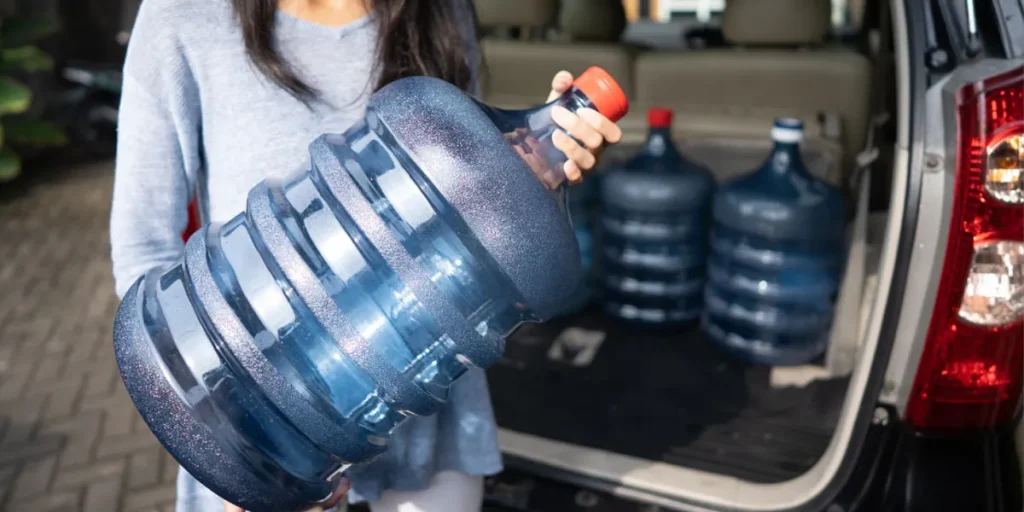Two hundred and ten gallons of water weigh approximately 1,751 pounds or 794 kilograms. Water’s weight is a crucial factor in numerous applications, from home aquariums to industrial processes.
Understanding the weight of water is essential when considering the structural integrity of containers or platforms, or when calculating shipping costs.
Precise measurements are imperative across various sectors, including agriculture, where water management is key, or in the fitness industry, where aqua-based workouts necessitate specific water volumes and weights.
Homeowners, too, might need this information before installing a large fish tank or hot tub, ensuring their floors can support the weight.
Knowledge of water’s weight helps in emergency preparedness as well, where large quantities of water are stored for potential crisis situations.
With sustainability in focus, understanding water’s mass aids in developing more efficient transport and storage strategies, contributing to resource conservation.
The Basics Of Water Weight
Understanding how much water weighs is important for many tasks. Water weight can be tricky because it depends on temperature and other factors.
A gallon of water typically weighs 8.34 pounds. However, this is a rough estimate. Exact measurements may vary.
Let’s dive into how we can convert gallons to pounds and explore what affects the water’s weight.
Gallon To Pound Conversion
To figure out how much 210 gallons of water weigh, use the standard conversion factor. One gallon of water usually equals 8.34 pounds. Here is a simple math:
| Gallons of Water | Weight in Pounds (approx.) |
|---|---|
| 1 | 8.34 |
| 210 | 1,751.40 |
So, 210 gallons of water weigh approximately 1,751.40 pounds.
Factors Affecting Water’s Weight
However, water’s weight is not constant. It changes. Several factors influence it.
- Temperature: Warmer water is lighter due to expansion.
- Impurities: Dissolved substances can add to the weight.
- Salinity: Saltwater weighs more than freshwater.
- Altitude: Water weighs less at higher altitudes.
Keep these factors in mind when calculating the weight of water. This helps in getting a more accurate result.
Measuring Up: The 210-gallon Benchmark

When it comes to working with liquids, volume is a common measurement. But sometimes, you need the weight to plan better. Picture a huge 210-gallon tank.
That’s a lot, right? But just how much weight are we talking about? Let’s dive into the world of conversion and find out the specifics for water.
From Volume To Mass: Calculations
First, understand that 1 gallon of water is equivalent to 8.34 pounds. Simple multiplication gives us the weight of our 210 gallons.
| Gallons of Water | Pounds per Gallon | Total Weight (pounds) |
|---|---|---|
| 210 | 8.34 | 1751.4 |
Now, we see that 210 gallons of water weigh approximately 1751.4 pounds!
Understanding Variabilities In Measurement
However, weight can fluctuate with temperature. Cold water is denser, and heat can cause expansion. This means the weight of water isn’t always constant.
- At room temperature: 210 gallons roughly weigh 1751.4 pounds.
- When heated: The volume can expand, causing slight weight reduction.
- In extreme cold: Water contracts, increasing density, possibly increasing weight slightly.
Practical Insights Into 210 Gallons Of Water
Understanding the weight of water is crucial in many situations. When it comes to 210 gallons, knowing its weight can help in various ways.
Let’s dive into the practical insights into 210 gallons of water.
Everyday Scenarios
Filling a hot tub or a small swimming pool often requires around 210 gallons. Picture a hot tub brimming with clean water for a relaxing evening. Here’s how much that water weighs:
- 1 gallon of water weighs about 8.34 pounds.
- 210 gallons therefore weigh roughly 1,751.4 pounds or 795 kilograms.
Understanding this helps measure the load on your deck or floor, preventing potential damage.
In gardening, a rain barrel can hold up to 210 gallons. This is useful for:
- Watering plants.
- Saving on water bills.
- Being environmentally friendly.
A fully loaded rain barrel has a weight that must be considered for safe installation and support.
Use Cases In Industry
In industries, 210 gallons of water have specific weights, critical for:
- Shipping and transport, where it influences fuel economy and vehicle handling.
- Manufacturing processes that rely on precise water amounts.
- Fire suppression systems, where knowing the total weight of water aids in design and engineering.
Damage prevention is also crucial. This includes:
| Scenario | Relevance of 210 Gallon Weight |
|---|---|
| Chemical spill cleanup | Weight determines the amount of water for dilution. |
| Product testing | Water weight simulates different stress tests on materials. |
Therefore, knowing the weight of 210 gallons of water is a cornerstone in both everyday life and various industrial applications.
Comparing 210 Gallons To Common Objects

Imagine filling a large container with 210 gallons of water. It’s hard to visualize that amount, isn’t it? Let’s bring that figure to life by comparing it to objects we see around us every day.
Automobiles And Water Equivalent
When we think of a car, we don’t often associate it with water. But 210 gallons have a surprising link to automobiles.
Here’s a fun fact: the average car weighs about 4,000 pounds. A gallon of water weighs 8.34 pounds. So, 210 gallons of water tip the scales at 1,751.4 pounds.
- Compact car: Around half the weight of a small car.
- SUV: Close to a quarter of the weight of a large SUV.
Household Items And Volume Comparisons
Let’s shrink down to items inside our homes to grasp the volume of 210 gallons. Think of milk jugs, bathtubs, and laundry loads.
| Item | Equals how many gallons | Comparative # of Items to 210 Gallons |
|---|---|---|
| Standard milk jug | 1 gallon | 210 jugs |
| Average bathtub | 30-50 gallons | 4-7 bathtubs |
| Washing machine | 20 gallons per load | 10.5 loads |
These everyday comparisons show just how massive 210 gallons truly are – equal to a small fleet of milk jugs or several days of laundry.
Next time you see these items, you’ll have a new perspective on their volume and weight.
Handling The Heft: Moving 210 Gallons
Moving 210 gallons of water isn’t a splash in the bucket. This task is akin to relocating a small whale!
Before diving into the logistics and assessing the weight, it’s crucial to understand that a gallon of water weighs about 8.34 pounds.
Therefore, 210 gallons come in at a hefty 1,751.4 pounds. That’s nearly the weight of a grand piano!
Logistics And Transportation
Thinking of moving such a voluminous load? Plan ahead with the right equipment and vehicle. Consider these:
- Durable tanks or containers with secure lids to prevent spillage
- Sturdy dolly or hand truck rated for the weight
- Heavy-duty pickup truck or trailer with a load capacity that exceeds the water weight
Enlist a vehicle designed for heavy lifting. This ensures safe and efficient transport from point A to B.
Safety Measures And Precautions
Prevent accidents with these safety tips:
- Recruit help – Moving over 1.5k pounds is a task for many hands.
- Use proper lifting techniques – Lift from your legs, not your back, to minimize injury.
- Secure the load – Use straps to anchor the water containers during transit.
- Drive carefully – Navigate with extra caution given the added weight.
With these strategies in place, moving 210 gallons of water can be a smooth sailing operation.
The Value Of 210 Gallons
Picture a small swimming pool holding 210 gallons of water. It’s not just a quantity; it’s a precious resource. Conserving 210 gallons of water can make a big impact.
A gallon of water weighs about 8.34 pounds. So, 210 gallons would be roughly 1,751.4 pounds. That’s as heavy as a small car!
Understanding the weight helps us grasp how much water we use and need to save.
Environmental Impact
Every drop of water saved helps our planet. When we use less water, we leave more in rivers and lakes. This helps fish and plants to thrive.
It also means using less energy to pump and heat water. Saving 210 gallons can reduce our carbon footprint significantly.
Water Usage Efficiency Tips
Here are simple ways to save water:
- Fix leaks: A dripping faucet can waste gallons.
- Short showers: Cutting shower time saves water.
- Full loads: Run dishwashers and washing machines with full loads only.
Small changes lead to big savings.
| Action | Water Saved |
|---|---|
| Fix a leak | 20 gallons/day |
| Shorten your shower | 5 gallons/minute |
| Full loads | Up to 50 gallons/load |
FAQs About the Weight of 210 Gallons of Water
What Is The Weight Of 210 Gallons Of Water?
The weight of 210 gallons of water is approximately 1,750 pounds. This estimation assumes that the water is fresh; saltwater would weigh slightly more due to the dissolved minerals.
How Do You Convert Gallons To Pounds For Water?
To convert gallons to pounds for water, multiply the number of gallons by the weight of one gallon.
Since one gallon of fresh water approximately weighs 8. 34 pounds, multiply this by the gallon amount.
For example, 210 gallons would weigh 1,750 pounds (210 x 8.
Does Temperature Affect The Weight Of Water?
Temperature does not affect the weight of water, but it does affect its density and volume.
The weight remains constant for a fixed volume of water regardless of temperature changes.
Can The Weight Of Water Be Different?
The weight of water can vary slightly depending on its temperature and purity.
Colder water is denser, and impurities or minerals (as in saltwater) can increase water’s weight per gallon.
Conclusion
Wrapping up, understanding the weight of 210 gallons of water is crucial for various applications. It tips the scales at approximately 1,750 pounds, influenced by temperature and purity.
Keep these factors in mind for precise measurements in your projects. The knowledge simplifies tackling tasks, from home brewing to large-scale aquatics.
Stay informed and weigh your water wisely!
Resources:
https://www.usgs.gov/special-topics/water-science-school/science/facts-about-water
https://www.gao.gov/water-quality-and-protection
